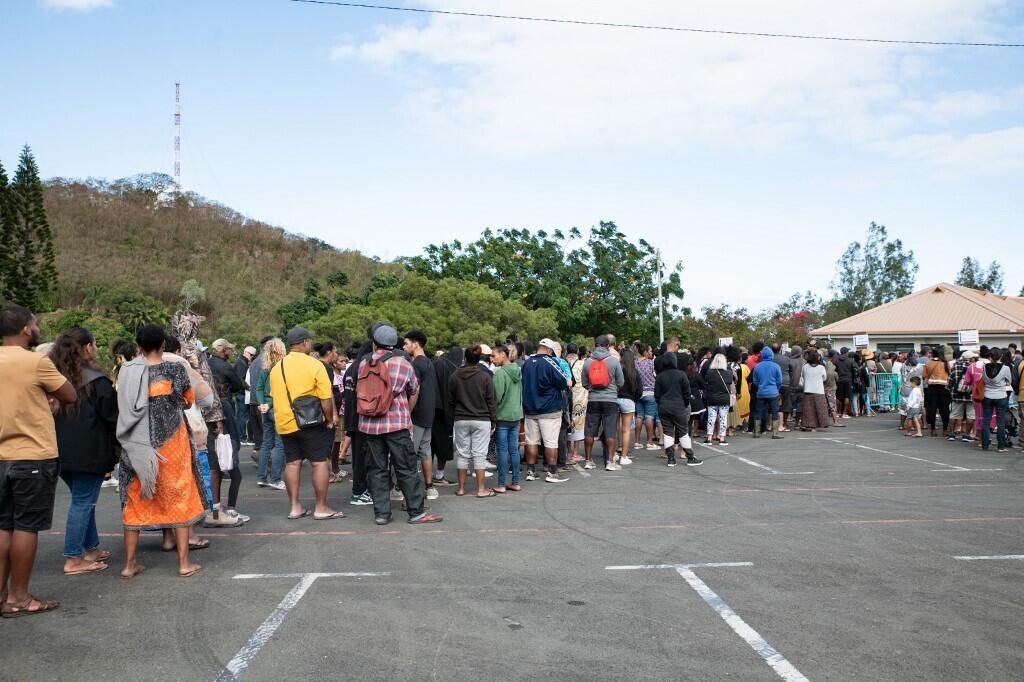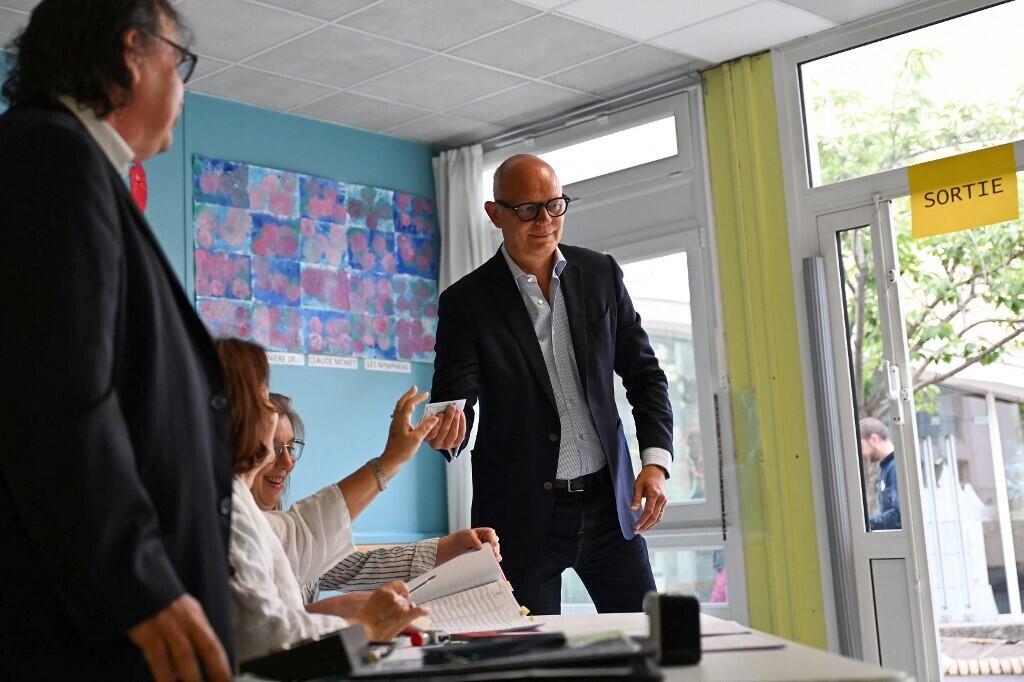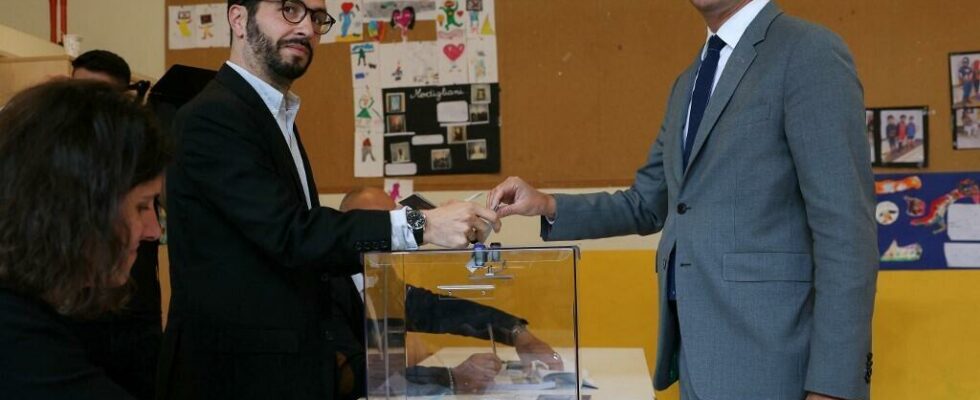This Sunday, July 7, French voters are once again called to the polls to elect their deputies after the surprise dissolution of the National Assembly on June 9 and a victory for the National Rally (RN) in the first round on June 30.
What you must remember :
■ The French put the National Rally in the lead in the first round of the legislative electionsSunday, June 30. The RN and its allies totaled 33.2% of the votes, ahead of the alliance of left-wing parties, the New Popular Front, with 28% and the presidential coalition Ensemble which collected 20% of the votes. The Republicans came in fourth place with 6.5%.
■ At the end of the first round76 out of 577 deputies were elected. There are therefore 501 deputies left to be elected this Sunday. Of the 76 elected deputies, 39 come from the ranks of the RN and its allies, who came out on top in more than one constituency out of two, and 31 are supported by the New Popular Front. Two candidates from Ensemble, two from the center and one from LR also obtained a seat in the hemicycle.
■ 306 triangular and five quadrangular were possible after the first round. But with the record number of 224 withdrawals to block the RN as part of the “republican front”, their number has drastically decreased. There are still 89 triangular and two quadrangular contests. As a result, the number of duels has increased: from 190 to 409. They mainly pit the RN against the NFP and the RN against Ensemble. The question of the transfer of votes could determine the outcome of many of these clashes.
Information given in universal time (Paris time -2h), Click here to refresh
8:45 a.m.: update on overseas results
♦ Disappointment for the RN in Guadeloupe
The outgoing deputies were re-elected in the four Guadeloupean constituencies, notably against the two candidates of the National Rally, who had made a breakthrough by qualifying for the second round. Respectively beaten by the two outgoing DVG Christian Baptiste (72.38%) and Max Mathiasin (69.15%), Laurent Petit (RN) recorded 27.62% of the votes and Rody Tolassy, local headliner of the RN, 30.85%.
This is a setback for the latter, elected to the European Parliament on June 9 and who, in the 2022 legislative elections, narrowly escaped election by winning nearly 48% of the votes in the second round. The outgoing LIOT MP Olivier Serva, a miscellaneous left candidate, won with 77.59% of the vote and Elie Califer (PS) with 71.09%. The turnout is 34.67%, a sharp increase compared to 2022 (28%).
♦ Guyana: full house on the left
The two outgoing deputies of Guyana, supported by the New Popular Front, were re-elected. The regionalist Jean-Victor Castor won in the 1st constituency with a comfortable score of 76.11% of the votes cast against an independent candidate, Boris Chong-Sit.
In the second constituency, the outgoing president of the overseas delegation to the National Assembly, Davy Rimane, was re-elected, although he was the only candidate in the running after the withdrawal of the independent candidate who came in second, Sophie Charles. The final turnout was 24.98%.
♦ Martinique: NFP wins the bet, with a surprise
Outgoing MP Jean-Philippe Nilor (New Popular Front) crushed (86.58%) the duel that pitted him against an RN opponent. Already well ahead in the first round, he nevertheless lacked having crossed the 25% mark of registered voters to qualify straight away. In the 1st and 2nd constituencies, incumbents Jiovanny William (81.97%) and Marcellin Nadeau (65.68%), came in comfortably ahead under the NFP banner.
Socialist candidate Béatrice Bellay created a surprise in the 3rd constituency by winning (54.53%) against the incumbent Johnny Hajjar, who came out on top in the first round for the NFP, which is also claimed by the first secretary of the PS of Martinique.
8:32: [Photo] Prime Minister Gabriel Attal voted in Vanves, in Hauts-de-Seine
8:20 a.m.: Uncertainties and scenarios for the “day after”
Everything will depend on the National Rally’s score. If it reaches an absolute majority with 289 deputies or comes close, then Emmanuel Macron will have to appoint Jordan Bardella as Prime Minister and he will go to Matignon to form a government. If this is not the case, a period of uncertainty and intense negotiations would open after trying elections for the parties and the country.
Will the National Rally, in a relative majority situation, manage to rally the votes it lacks to form an absolute majority? Conversely, will the other parties succeed in forming an alternative majority, as several leading members of the majority have called for? Without a coalition, there is no solution to form a government and make the Assembly work. But a coalition with whom and how? On paper, the option is conceivable, in political reality, it will be difficult to build.
There still remains the hypothesis of a technical government, like the one that saved Italy from the debt crisis in 2011. Whatever option Emmanuel Macron takes, the choice of the next Prime Minister will be decisive and complicated.
Read alsoFrench legislative elections: the options for the day after
8 a.m.: [Photo] Voters wait to cast their ballot in New Caledonia

7:40 a.m.: Parisians begin voting in the capital
Some Parisians came straight out of bed, says our journalist. Eva Kling dispatched to a polling station in the capital. A quarter of an hour before the opening, about ten people were waiting. At 8 o’clock sharp, the doors opened. Since then, about thirty people have entered the primary school. But the streets of Paris are still calm. The city is slowly waking up. A few retirees have come to drop off their ballots before their morning walk, as well as parents with their children or voters with suitcases. The election falls on the first weekend of the summer holidays, so they had to postpone their vacation departures. The organization seems fluid, there is no queue. According to the president of the polling station, there will be as many people this morning as last Sunday at the same time.
7:30 a.m.: [Photo] Former Prime Minister Edouard Philippe voted in Le Havre

7:15 a.m.: Participation, key to the vote
Among the most scrutinized figures of these elections: participation. It should be one of the keys to the second round. Last Sunday, the French had not been so numerous to move since 1997. For the first round, the participation had reached more than 66 %and this figure could be at the same level, or even higher, for the second round.
If this were confirmed, this would make these legislative elections the most followed by the French in over thirty years. Proof of the renewed interest in the second round, the number of proxies has exploded again: 3.2 million according to the Ministry of the Interior, that’s 600,000 more than in the first round. But uncertainty reigns. It is difficult to predict who might benefit from this participation.
Read alsoLegislative elections in France: participation in the second round, key to the vote
6:40 a.m.: [Reportage] French people in Quebec prefer electronic voting
La Belle Province is the largest contingent of French voters established outside of metropolitan France and more than a quarter of French voters registered in North America. Generally, the polling stations are packed, voting sometimes gives rise to hours of waiting. But after a few hiccups, electronic voting is working better and better. So everything went very quickly for the few voters who chose to go to the polling booth this Saturday.
Listen to our correspondent’s report Alexis Gacon, at the Montreal polling station.
The turnout for electronic voting was very high, much higher than for the 2022 legislative elections…
The French in Quebec have favored electronic voting
6:20 a.m.: Provisional results are starting to come in overseas
In the North Atlantic archipelago of Saint-Pierre-et-Miquelon, the incumbent candidate Stéphane Lenormand (Archipel Demain) was re-elected. This was also the case in Guyana with Davy Rimane (non-partisan) and Jean-Victor Castor (MDES). Olivier Serva (DVG), Christian Baptiste (DVG) and Max Mathiasin (DVG) were also re-elected in Guadeloupe. Three incumbent MPs were re-elected in Martinique, but in the 3rd constituency (Fort-de-France), the socialist candidate Béatrice Bellay created a surprise.
The details of the provisional results are available on the site of La 1ere.
6h: Polling stations open in metropolitan France for the second round
Polling stations are open until 6 p.m., or 8 p.m. in major cities. Voters in Saint Pierre and Miquelon, Saint Barthélemy, Saint Martin, Guadeloupe, Martinique, Guyana, French Polynesia and those living on the American continent were called to vote on Saturday.
